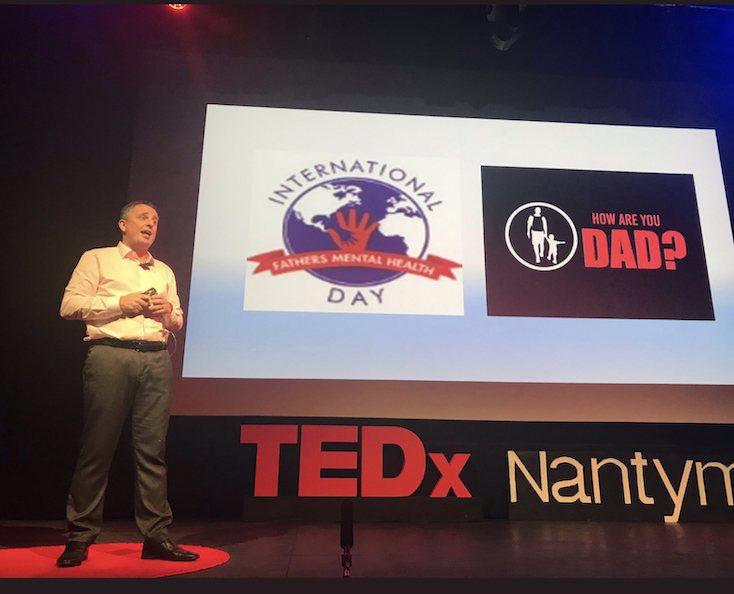
Ask DadPad, Long Read, Mental Health
Ask DadPad: How can I best support my own and my partner’s perinatal mental health?
Posted on 28th July 2020
*** Trigger warning ***
During July, as part of their #TalkToUs month, the Samaritans are celebrating their many volunteers, who provide emotional support 24 hours a day, 7 days a week. For those of us struggling with our mental health, the volunteer at the end of a phone line, text message or email could be just the lifeline that we need.
At DadPad, we know that maintaining our emotional wellbeing can be especially hard around the time of becoming a new parent and that’s why we’re always working on raising awareness of the fact that – just like mums – dads can also suffer with their mental health at any time, but especially during the perinatal period. [In case you weren’t sure, in mental health terms, the perinatal period is viewed as covering pregnancy and through the first year following baby’s birth.]

Mark Williams speaking at TEDx Nantymoel in early 2020 on The importance of new fathers’ mental health.
In his TEDx talk, Mark Williams quotes some of the following statistics from various research studies:
- 1 in 10 dads suffer from PND – that’s 75,000 dads each year in the UK
- An average of 10.4% of fathers are depressed both pre- and post-natally, with the peak time for fathers’ depression being between three and six months post-birth (Paulson & Brazemore, 2010)
- 24%-50% of new dads with partners suffering from depression were also affected by depression themselves (Goodman, 2004)
- Up to 38% of new dads are worried about their mental health (NCT)
- 33% of young fathers wanted support for their mental health and there was nothing for them (NCT)
- 20% of new dads felt completely isolated during their first year of fatherhood (Movember)
- 33% of dads were stressed during the perinatal period (Movember)
- Fathers with perinatal mental health problems are 47 times more likely to be rated as a suicide risk than at any other time in their lives (Quevedo et al, 2010)
- And there are at least 600,000 male suicides each year (with the figure probably even higher in reality, due to the stigma surrounding suicide)
These are pretty eye-opening and worrying figures, which is why we believe it is so important to ensure that all dads-to-be and new dads are provided with the information and support that they need to not only recognise, but also seek help, for any emotional and mental health difficulties that they and/or their partner might be experiencing.
Raising awareness of these issues is only part – but still a very important part – of the battle to help dads and men who are struggling. It’s not enough to simply say: “It’s OK not to be OK”. We need to ensure – for those dads who come forward and say, “I need help” – that there is help available.
What we’re hoping to achieve in this blog post is to give you – whoever you are – some ideas on what you can do if you think that you are struggling. We’ve spoken with some of our key perinatal mental health contacts and experts, in order to ensure that this article contains the best information, help and advice possible.
Post-natal depression – that’s just for mums, though, right?
Wrong! Post-natal depression (or PND) – as defined by the NHS – is:
A type of depression that many parents experience after having a baby. It’s a common problem, affecting more than 1 in every 10 women within a year of giving birth. It can also affect fathers and partners.
A widely-held view is that PND is based on hormones, and that – as only mums experience a hormone change in pregnancy and post-birth – men can’t get PND. However, this perception is wrong on both counts.
Firstly, hormonal changes affect dads as well as mums, as Kieran Anders of DadMatters UK confirms:
Just as mums experience hormonal changes around the time of birth, there’s also a drop in testosterone and a rise in oestrogen in men, so they also experience hormonal change (although it is more nuanced).
If that surprises you, there’s a perfectly logical reason for it. Dr Anna Machin, an evolutionary anthropologist, has explained that the drop in testosterone helps dads to become a more sensitive father, better able to meet their child’s every need.
Secondly, it’s now recognised that PND is caused by a combination of two things – hormonal changes and situational changes. Mental health campaigner and educator, Dr Andy Mayers, explains:
Often, the perception is that dads cannot get PND because it’s hormonal. As it happens, hormones play a very small part in the risk for maternal PND. Environmental factors (such as income, housing, partner support, the mother not having her own mother close by, education, etc) and psychological ones (previous mental health, coping skills, etc) play a much larger part in maternal PND.
And therefore, as both dads and mums will be experiencing the impact of hormonal, environmental and psychological factors, as well as situational changes – including lack of sleep, added responsibility, increased worry about all sorts of things, dealing with your wider family, etc – it soon becomes clear that PND is just as likely to affect you as it is to affect your partner.
One thing Kieran tells us always to remember, though, is that: “Importantly, this depression is because [you] have a baby, and NOT because [you] are a man with depression.”

(L-R) DadPad’s Julian with Kieran Anders of Dad Matters, Ash Curry, and Dr Andy Mayers – 2019.
PND – what to look out for
So what are the symptoms that you need to look out, in both yourself and your partner, which might suggest that you are suffering from PND?
The first thing to be aware of is that you will probably have heard mention of the mum suffering from ‘baby blues’ and might wonder what this is. Over 70% of new mums experience ‘baby blues’, and it’s not the same as PND. The Perinatal Mental Health Team at Worcestershire emphasise that it is, “important for dads to be aware of baby blues and that it is ‘normal’. Women can be very tearful, emotional and upset during this time and may struggle to explain why. It will resolve itself after a couple of days. If it doesn’t, then it’s worth speaking to your midwife or health visitor.”
In terms of actual PND, Dr Andy Mayers reminds us that, “…PND (like ‘depression’) is not just about being sad. While low mood is common, another crucial symptom is losing the motivation to do those things we would normally do. It’s also about the duration, frequency and timing of symptoms.”
Dr Mayers also stresses that there are similarities and differences in PND for mums and dads. Firstly in your partner, there are a range of behaviours that you should be alert to and our experts each gave us some different suggestions on these; this just goes to show the many ways in which PND can present itself and/or be experienced. We’ll start with Kelly Arnold, Interim Perinatal Mental Health Team Lead at the Betsi Cadwaladr University Health Board:
Your partner may become withdrawn, more tearful or feeling that she is not good enough as a mum. Sometimes [she] may find it difficult to bond with baby, but this is not always the case. Sometimes mum can feel over-protective of baby and have anxious thoughts around harm coming to baby.
Kieran Anders adds that: “Mum might still be able to do all the practical stuff – changing nappies, feeding, etc – but it’s all about whether [she’s] responding to baby’s cues, nuanced little cues like returning a smile, responding when they [baby] lifts their hands to play.”
The team at Worcestershire added that it is “worth dads being aware that irritability is often a symptom of postnatal depression, along with low mood.”
Kerry Thomas, from PANDAS (the Pre and Post Natal Depression Advice and Support charity) suggested the following:
…consistent low mood and heightened anxiety, persistent sadness, frightening thoughts that won’t ‘go away’, feelings of worthlessness and struggling to bond with your baby.
Finally, Dr Andy Mayers provided a list of symptoms that could be experienced by both mum or dad, including:
- Low mood
- Poor motivation
- Changes in appetite
- Poor sleep (over and above what normally happens with a new baby)
- Poor concentration
- Feelings of guilt and/or worthlessness
- Thoughts of death or dying (including suicidal thoughts)
Where dads are concerned, though, as well as being alert to any of the above behaviours in yourself, you may experience PND in other ways. Kelly explains:
For men, symptoms may feel or be recognised a little differently – feeling angry/irritated more easily, increased consumption of alcohol or cigarettes, needing to exercise more or finding that you would rather be out of the family home. Dads can also feel that they are not bonded with their baby, too.
Mark Williams has also explained how PND symptoms look different in men: “There’s more avoidance, overworking, drinking and substance abuse.”
It’s useful to hear from real-life dads who have experienced PND themselves, to get the best idea of what it feels like. We hugely appreciated hearing Michael’s story, which was shared on the PANDAS Twitter page (and shared again here with theirs, and Michael’s, permission), back in June.
— PANDAS (@Pandas_uk) June 22, 2020
Michael found his mental health suffering following the birth of his second child, who was diagnosed with a terminal heart defect. He described his symptoms:
I found myself crying a lot. I found myself feeling – yeah – very depressed about the whole situation. I just didn’t know how to let people know that I was hurting, that there was those days where I couldn’t function, I just didn’t want to be here anymore. I wanted the thought of everything and the pain to stop, and it wasn’t a really good time. There were times when I would go to bed and I would have really horrible nightmares. There were times when I just couldn’t sleep because I would worry so much.
Mark Williams suffered a breakdown five years after first witnessing the traumatic birth of his son, and then supporting his wife through severe PND, which manifested soon after the family returned home from hospital. He experienced:
…worry that I wasn’t going to be good enough to be a father, [concern about] how I was going to support this child, waking up with nightmares about the birth… [I was] frustrated, drinking and worried for my situation, trying to avoid myself, family and friends.
During that postnatal period, my personality changed. I remember punching the sofa, I bust my hand. I was avoiding situations. I was using alcohol… I couldn’t tell my wife how I was feeling because I didn’t want that to impact on her mental health. And I was actually having suicidal thoughts in the postnatal period as well. But as a man I was told just to man up and get on with it. “What have you got to be depressed about? You didn’t give birth to the baby.” I was more concerned about my wife.
Before concluding this section, it’s important to note that there are other mental health conditions to be alert to in the perinatal period, including postpartum psychosis (or PP) in mum, and post-traumatic stress disorder (or PTSD), anxiety and/or OCD in either parent. Although we aren’t going to explore these topics in further depth in this article, we have included some links to further reading on these conditions at the end of this blog.

Planning ahead
One of the most important things that you and your partner can do in the run up to baby’s arrival is to start reading up on potential mental health difficulties that you might face (and it’s brilliant that you’re here, as that means you’re already doing that!), and talking together about how you might deal with them.
It’s important to be open to the fact that – even if you and/or your partner have no history of mental health problems – it is something that you might need to deal with. Preparation and communication are both key.
If possible, go to as many antenatal classes with your partner as you can. Although they won’t always cover aspects of mental health and wellbeing in detail, they are still a good thing to do, as Kelly Arnold explains:
Attending appointments with your partner will help you feel more involved in the arrival of your new baby and also give you the opportunity to ask questions about things that may be worrying you.
Dr Andy Mayers also encourages dads-to-be to “feel confident to ask questions“. It will be a huge help for you to learn as much as you can on baby care in advance, to help you gain confidence and reduce the risk of feeling overwhelmed and/or anxious in your new role. This, in turn, may help reduce the risk of your mental health deteriorating. We’d also recommend that you get hold of a DadPad and/or DadPad app as these both contain lots of good advice on key skills for new parents as well as information on mental health for mum and dad, and the app will also have links to sources of local and national support and crisis response.
If you’re lucky, there may be a specific support group for dads in your area, such as Dad Matters. Kieran Anders explains that the Dad Matters DadChat groups include antenatal discussions around mental health, with dads first asked to identify the sort of things – the ‘red flags’, if you like – that he will need to look out for in mum and then consider how he would approach that with her. This discussion then hopefully makes it easier for dad to appreciate that he will need to be looking out for the same things in himself.
Keep talking…
It’s also important to talk to those around you – including, of course, baby’s mum – about what they should be looking out for in you. Kieran encourages dads-to-be and new dads to “keep open the lines of communication with the people closest to you to recognise possible changes in [your] behaviour.”
This period of your lives will be a huge test of your relationship – Kerry at PANDAS comments: “…the mental endurance test of supporting a pregnant partner through pregnancy, birth and beyond is testing” – and strategies that the two of you come up with to help deal with this will not only be beneficial to you both, in terms of building a strong, long-lasting relationship, but also for your family’s future wellbeing. Be open to the fact that “having a new baby can be stressful and often adds to a lot of mixed emotions within the family unit… [and remember that], by speaking with your partner about your worries, this is the first step in reducing your risk of further mental health deterioration” (Kelly Arnold).
One thing to consider is the reminder from the perinatal mental health team at Worcestershire not to forget “how important sleep is and that sleep deprivation is a major issue in the postnatal period. Any steps which help both mum and dad get more sleep will be beneficial.”
Finally, don’t ever forget that you, “…as a father, are equal in terms of importance …[and it is therefore] crucial you give yourself the time, self-care and accept any support and help that could be offered” (Kerry at PANDAS).
Help!
So, if you do find yourself struggling, what should you do?
Firstly, and probably most importantly, you need to talk to someone. The obvious candidates for this are, of course, your partner, your family and/or your friends, but this might not always be possible. You might be worried about adding to your partner’s own stresses or difficulties, for example.
Another option might be to talk to one of the health professionals around you – such as your GP, or your family’s Health Visitor or Midwife. Remember that those services “are all available to support dad’s mental health as well as mum’s” (Kelly Arnold), so don’t feel that they won’t be interested.
If none of this feels like something you can do, Kieran at Dad Matters also advocates for finding a peer support group (if there is one) near you, or even an online support group, “where you can let it all out anonymously.” The crucial thing is that you DO take the steps to unburden yourself as: “Once you’ve done this, then you can take the steps that you need to fix it. Acknowledging how you’re feeling before you get to the point of needing professional support means that you’ll be less likely to need professional support.”
Kelly Arnold supports this advice: “…being open about how you are feeling about your new baby or any worries that you have will be the first step in making those worries a little less overwhelming.”
It may well be that, once you’ve started to talk to someone about how you are feeling, you will be able to start sorting out your problems without any further assistance. However, if you – or your partner – feel that you might need more help (if your symptoms are getting worse, or are not improving), then it is essential that you seek additional support.

Unfortunately, at the moment, dedicated support groups for fathers are limited. The good news is that Dr Andy Mayers is trying to keep an up-to-date list on his website, so this is definitely worth a look. He and Mark Williams also recommend the online Hub of Hope as a “really good resource for searching local services.”
Dad Matters provide peer support for dads, attempting to fill the gap between a man becoming a dad and when he starts to struggle. They find that most men won’t accept help until late on in the cycle. They therefore support men antenatally, with resources, support, and drop-in clinics. These cover three key points: (1) attachment and bonding (which help to break cycles of poor bonding, and its effect); (2) mums’ and dads’ mental health (to enable dads to acknowledge their own mental health); and (3) accessing services (which includes signposting services which dad might otherwise avoid, such as midwifery, health visiting, and Children’s Centres).
The PANDAS Foundation offers “free peer-to-peer support for every parent, and their network, who needs it. With experts in our field, we offer advice from trained volunteers with a wealth of lived, academic and work experience within mental health. We offer education, positive and motivational content based on lived experiences, and a wealth of knowledge, hope, empathy and signposting through our four support channels: free helpline, email support, group support (currently on hold at the time of writing, due to the pandemic) and also our inspirational social media channels.”
Kerry adds, though, that whilst “social media can be useful if following motivational and positive content, …it can also be an unwelcome distraction when used as a comparison tool.”
Whichever – if any – of the above options you choose to explore, we strongly recommend that you speak to your GP or Health Visitor ASAP, if you haven’t already done so; they will not judge you, or consider you to be a ‘bad parent’. In fact, they will be pleased that you have felt able to talk to them about your concerns, and will also be able to help you work out the best course of action to help you start to feel better.

Don’t be afraid…
We ended our chats with each of our experts by asking them to share with us one simple piece of advice for a new dad who thinks he might be struggling with his mental health since becoming a parent, and we want to draw this blog post to an end by sharing them with you – we were not surprised to see how similar their advice was!
- Dr Andy Mayers: Quite simply, don’t be afraid to talk about your mental health and then feel confident to seek that help. Keeping quiet and doing nothing will only make it worse.
- Kieran Anders – Dad Matters: Talk to someone. Whoever it is is irrelevant – just talk.
- Kelly Arnold: Talk to someone! It doesn’t matter who that someone is… Dad’s mental health is as important as mums and the services around a family within the perinatal period are there to support both mum and dad.
- Kerry Thomas – PANDAS: You are significant and your feelings are valid. Do not undermine your own thoughts struggling with your mental health, but equally do not underestimate the strength you have and the support available through PANDAS and the NHS for parents who are able to recover from perinatal mental illness.
- Mark Williams: If you are struggling in silence, make sure you speak to somebody today. There’s no shame – speak to your family members, doctors, health visitors, any health professionals. If you’re not getting the support off them, make sure you try somebody else until you get that support.
- Worcestershire Perinatal Mental Health Team: If in doubt, speak to a professional. This could be your Health Visitor, Midwife or GP, for advice.
And we’ll end with a little advice from us, at DadPad:
Remember that, your baby needs a dad who will read with her, play with her and interact with her. A dad who is depressed is less likely to want to do this. The close emotional relationship that babies, infants and children have with their carers will influence them for the whole of their lives. Staying positive and emotionally well will help you influence your child's future for the better, and give them the best start. Don't be ashamed if you're struggling - seek help, because YOU matter!
Sources of support:
PANDAS Foundation UK
- FREE helpline: 0808 1961 776. Available on all landlines from Monday – Sunday 11.00 am-10.00 pm, the helpline is manned by a team of trained volunteers who will be happy to chat to you and direct you to the right support.
- Email Support: info@pandasfoundation.org.uk, available 365 days a year. They’ll respond within 72 hours, and you are invited to get in touch if you’d like any more information regarding perinatal mental illness or are looking for support for yourself or your partner, friend or colleague.
- PANDAS also have two Facebook groups that you might like to follow: (1) their main PANDAS Foundation page, on which their social media team updates on current perinatal mental health news and reports; and (2) their PANDAS Dads private group, where the PANDAS Dads volunteers are on hand, seven days a week, to offer support and information for dads and carers affected by perinatal mental illness.
Samaritans
- FREE helpline: 116 123. Available 24 hours a day, 365 days a year, Samaritans’ volunteers will listen to you, with no judgement or pressure, to help you work through what’s on your mind.
- If you find it easier to write things down, you can also email them on jo@samaritans.org (with a 24-hour response time) or write them a letter.
Mind‘s website also includes a list of mental health crisis helplines and listening services, which you may find useful.
Further reading and references:
NHS webpages:
- Post-natal depression (PND)
- Post-traumatic stress disorder (PTSD)
- Postpartum psychosis (PP)
- Obsessive compulsive disorder (OCD)
- Anxiety
Mind (mental health charity) webpages:
- Partners’ perinatal mental health
- Perinatal depression
- Perinatal post-traumatic stress disorder (PTSD)
- Postpartum psychosis (PP)
- Perinatal obsessive compulsive disorder (OCD)
- Perinatal anxiety
Hub of Hope website – mental health support network
Mark Williams’ TEDx talk: The importance of new fathers’ mental health
Dr Anna Machin’s TEDx talk: We need to change the conversation about fathers
Dr Andy Mayers’ fathers’ mental health webpage, including information on support groups for dads
Mark Williams’ Fathers Reaching Out website
The Guardian online article: Men get postnatal depression too – Tue 04 Sep 2018

